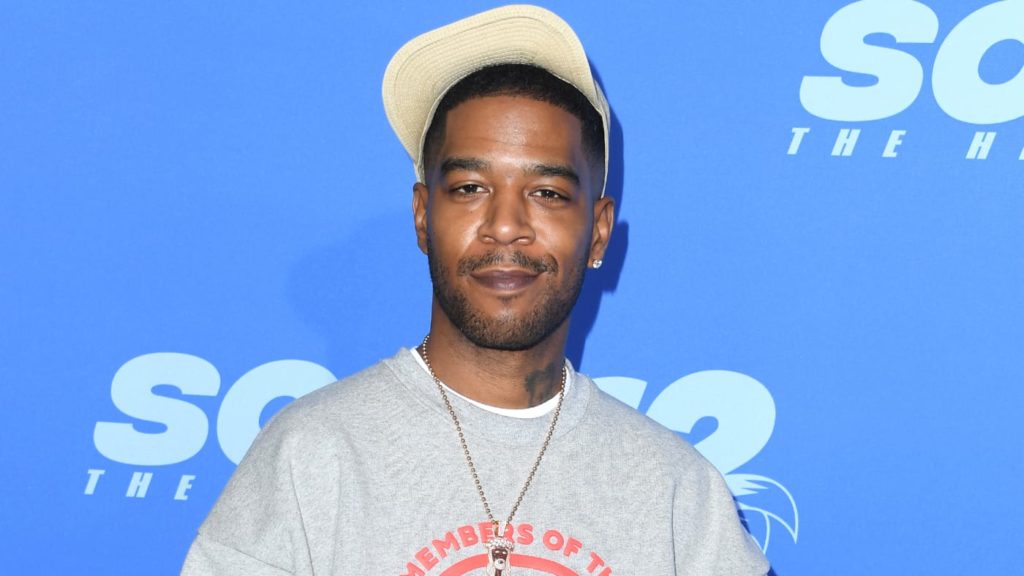With the release of Kid Cudi’s first greatest hits album, The Boy Who Flew to the Moon Vol. 1, Cudi’s music, as well as his past struggles, addiction, and effects of stardom, are resurfaced and analyzed.
The alternative rapper has established himself very well in the music industry, releasing Man on the Moon: End of Day in 2009, his debut album. In its first week, the album sold over 100,000 copies and charted at #4 on the Billboard Top 100. Although considered “stoner music” and “trip-hop”, Cudi and his 7 successful albums have earned him 2 Grammy awards alongside 5 nominations, as well as 22 million certified records sold in the United States.
Cudi’s take on hip-hop is very much different than that of your typical rapper; rhyming about getting money, girls, guns, etc. Cudi’s music is based around his emotions, feelings, mental struggles, and a consistent referral to his attempts of coping using marijuana, psychedelics, alcohol, and more.
Cudi’s debut song, “Day ‘N’ Nite”, turned out to be one of his most popular, with over 400 million streams on Spotify alone, earning a spot on his greatest hits. Cudi spoke on this track with lyrics database and digital media company Genius, explaining how he wrote the song for his uncle, who kicked him out of the house shortly before passing. Throughout the track, as he does with most of his music, Cudi doesn’t tell a story, but a process of emotions and thoughts created by a crucial event in his life. Cudi sings of his marijuana addiction, explaining how he smokes to escape from his pain and loss, until his bottled up thoughts and emotions are released at night, as he lies awake. Among the storm of staying high to forget and facing his demons, comes the alienation Cudi faced for years, unable to express himself to others, unable to trust others or even go out and see people.
Another smash hit and track #3 on Cudi’s debut album, “Pursuit of Happiness”, recently surpassing 300 million streams on Spotify, expresses his problem with addiction that’s quite difficult to understand. The song has an upbeat tone, as Cudi seems to sing the typical teenage message of “do drugs, have fun, don’t care”. However, Cudi reveals the dark undertone of the song. In another interview with Genius, Cudi explains the true meaning of the lyrics. “When I’m singing about driving drunk on “Pursuit of Happiness” on [Man On the Moon], you may remember that it was a nightmare. It was meant to be scary, the craziness, the fact that this person chooses to look for happiness in substances; and that’s scary, that’s a terrible combination, that’s a terrible way to go about things.” Cudder inputs a beautiful message into this track; He compares his music, once again, to his mentality. The track sounds positive, and tricks the audience into thinking it’s a party song about teens doing drugs, when in reality, Cudi is hiding his true feelings in the melody, and covering it with fake happiness, behind drugs, alcohol, and partying.
Cudder’s second studio album, Man on the Moon II: The Legend of Mr. Rager includes one of Cudi’s top streamed songs on Spotify (270+ million), the legend himself, “Mr. Rager”. This track, although open to multiple possible interpretations, still consists of his expressed loss, pain, and drug abuse. Cudi implies that his life has turned upside down almost literally, repeating throughout the track, “When will the fantasy end? (Yeah) When will the heaven begin? (Yeah)”. Cudi refers to reality as fantasy, as if it’s all a dream and none of it really matters: he takes drugs and partying more seriously than life itself (hence the song name). Heaven is represented as a high for Cudi, but also the sweet release of death, taking heaven quite literally. Cudi spoke with Complex to shed some light on the meaning behind “Mr. Rager,” as he explained, “This song is about someone who is fed up with reality, who looks for thrills and excitement by any means. It’s just kind of how I was feeling at that point. I was just so angry. Doing coke revived me, and knowing I was so close to death every time intrigued me. I liked the thought of it.” Cudi made both concepts of heaven relatable, to those who seek a heavenly high to escape reality, those who wish to be done with life and blessed with paradise, and those who suffer both trains of thought.
Posted to his Soundcloud in 2015 and gaining over 20 million streams (significant for a much smaller platform), “love.” is the last track on Cudi’s greatest hits album, signifying the end to his drug-induced madness. In track 18, Cudi speaks primarily of hope in his lyrics. 5 years after the release of The Kid’s sophomore album Man on the Moon II, Cudi sings of pushing through the negative things in life, instead of giving into the darkness. The lyrics throughout the song incites strength and moving on with life, two progressional themes for the rapper, as his previous songs and albums all revolved around the concept of pain, running away, and giving up. Cudi dropped an album in October of the same year, Speedin’ Bullet 2 Heaven. Although this album touches on ideas The Kid rapped about back in 2010, he revealed that this was an older project, released to satisfy fans until the much later release of his 2020 hit album, Man on the Moon III: The Chosen.
The significance of the placement of Tracks 1-18 on The Boy Who Flew to the Moon Vol. 1 is often overlooked. Mostly placed in chronological order, careful analysis of each song reveals, once again, not a story lined specifically with events, but a process of thoughts and emotions, as the significance of each song represents a part of his life which changed or shaped him. “Day ‘N’ Nite” The Kid’s debut hit single, takes #1, as it was his first big time track, as well as an explanation to the start of his addiction to marijuana; a gateway into a world of hard drugs, which Cudi struggled with severely. “Pursuit of Happiness”, at track #2, is Cudi’s acceptance of his constant substance abuse, after he fell to the world of numerous party drugs. The “Pursuit of Happiness”, as the name solidifies, was The Kid chasing happiness, as most people do, although the rapper was blindly following a path towards self destruction, not happiness.
“Just What I Am”, track #7, is self explanatory. The Kid speaks once again on accepting who he is, specifically in relation to smoking weed and tripping on LSD, as he even tweeted out after the release of the music video, “The Just What I Am video was designed to be watched on acid and/or shrooms. try it out!!! take the trip!!!” Track #12 on Cudi’s greatest hits, named according to the album of the same name, “Speedin’ Bullet 2 Heaven”, Mr. Solo Dolo (Album released in 2015 but written previously; 2015 represented a compelling change for Cudi) once again sings a message of acceptance, although The Kid travels beyond drugs and sings of accepting death wherever and whenever it serves him. Cudi doesn’t imply suicide, rather, he accepts the idea of death into his thoughts. Cudi repeats multiple verses throughout, such as “When I crash or when I land”, implying that he is not afraid of what is to eventually come. “I’ve traveled for miles, alone in the dark.” Cudi mentions this metaphor in relation to his alienation, his feeling of loneliness as he went through the darkest parts of his life alone, most likely the reason Cudi does not fear death.
Track #15, one of Cudi’s top hits from the third Man on the Moon album, “Tequila Shots” covers a multitude of Cudi’s deepest feelings. Within the theme of past self reflection, sorrow, and improvement, he attempts to explain that his mental health, represented by a repetitive verse, “Can’t stop this war in me”, has improved, but will not go away. Cudi also makes mention of his self-destructive behaviors, and how he feels deeply sorry for those he hurt in the process of hurting and healing throughout many years. “Do this to my loved ones, I’ve got some nerve”. Cudi also makes mention of criticism he’s received as a rapper for being “too emotional”. As Cudi raps, “I’m not just some sad dude, You can see my life, how I grew, I want serenity”. The Kid wants the world to know that his expression of negative emotions is a result of mental health issues he’s dealt with, and grown from, for many years, as he continues to discover peace within.
Track #18, as previously mentioned, is the turning point of Kid Cudi’s mentality. Although still struggling with mental health (love. was released 5 years previous to Tequila Shots on Soundcloud), Cudi now sees hope among all the bad, promising himself and others that things will get better. “Don’t be so down, c’mon, young homie, You’ll be okay, you’ll find real love, All of the stories, the hero gets lonely, Now is the time to show what you’re made of, Don’t be so down, c’mon, young homie You’ll be okay, you’ll find real love, All of the stories, the hero gets lonely, Now is the time to show what you’re made of.” The chorus is a beautiful and metaphoric representation of Cudi’s newfound positivity. The Kid, although littered with past trauma, drug addiction, mental issues, and an eternal sense of loneliness, managed to change after accepting his dying fate, on multiple occasions.
Cudi’s albums and songs were released based on previous actions and feelings. Mr. Solo Dolo, once becoming a father in March of 2010 to his daughter Vada Wamwene Mescudi, decided drugs were standing in the way of raising a family. He never attended rehab, but rather quit drugs “cold turkey”. While fighting through a custody battle with ex-wife Jamie Baratta, she accused Cudi of being an absentee father and lashing out due to drug/alcohol abuse. Cudi’s final stand against his drug addiction was proving that he was clean by taking a drug test. Results and custody details are private.
In January of 2013, Cudi revealed during an interview that he hadn’t had a sip of alcohol in 5 and a half months, also quitting “cold turkey”. It was also mentioned in this same interview that Cudi had done the same for cocaine. Cudi speaks on his commitment to sobriety and what it means to him, stating, “You get to a certain age where the people around you are not gonna be on that roller coaster all day long ready for you to go up, ready for you to go down, and stick with you through all the madness. People want you to be one person and stick with it and I chose to be clean and be sober and get my life together. For myself, for my health, for my daughter, for my family.”












